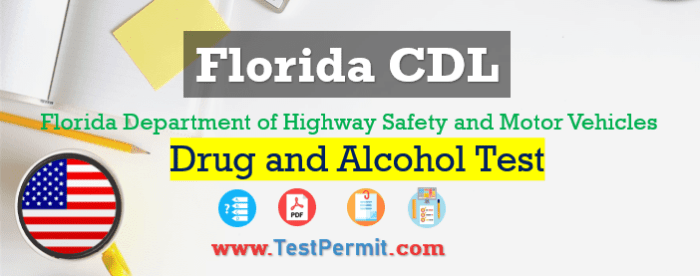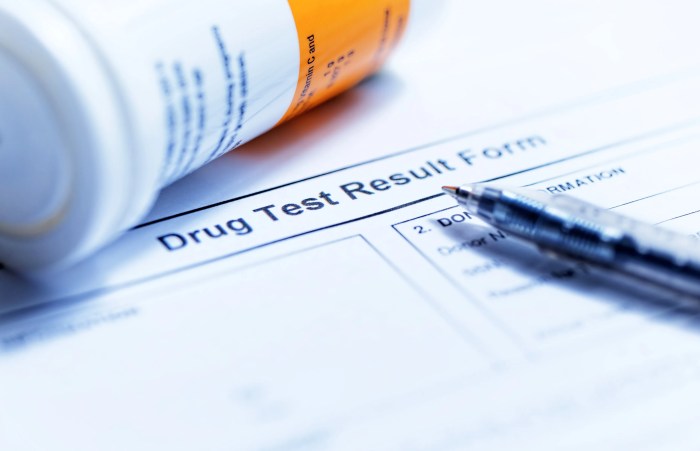Respuestas de examen de alcohol y drogas florida – Florida Alcohol and Drug Test Results: Consequences and Legal Implications delves into the critical role of alcohol and drug testing in Florida, exploring its legal ramifications and the importance of understanding test results. This comprehensive guide provides an in-depth analysis of the types of tests used, their accuracy, and how they are interpreted to determine impairment.
It also examines the legal consequences of positive test results, including penalties for driving under the influence and options for challenging test outcomes.
As we delve into the intricacies of alcohol and drug testing in Florida, we uncover the sobering statistics on related crashes, highlighting the urgent need for responsible driving practices. We also explore the various types of tests employed, ranging from breathalyzers to blood and urine tests, and discuss their reliability and accuracy.
Furthermore, we examine the factors that can influence test results, ensuring readers have a clear understanding of how these tests are conducted and interpreted.
Alcohol and Drug Testing in Florida

Alcohol and drug testing plays a crucial role in ensuring road safety and deterring impaired driving in Florida. The consequences of driving under the influence (DUI) are severe, and the state has implemented stringent measures to identify and penalize offenders.
According to the Florida Highway Safety and Motor Vehicles (FLHSMV), alcohol-related crashes accounted for over 40% of all traffic fatalities in the state in 2021. Drug-impaired driving is also a significant concern, with over 20% of drivers involved in fatal crashes testing positive for drugs.
Types of Alcohol and Drug Tests
Florida law enforcement utilizes various methods to test for alcohol and drug impairment. These tests include:
Breathalyzer Tests
- Measure the alcohol content in a person’s breath.
- Accurate and reliable when administered correctly.
Blood Tests
- Measure the alcohol or drug concentration in a person’s blood.
- Considered the most accurate method for determining impairment.
Urine Tests
- Detect the presence of drugs in a person’s urine.
- Can identify drug use over a longer period than blood or breath tests.
Field Sobriety Tests, Respuestas de examen de alcohol y drogas florida
- Physical and mental tests conducted by law enforcement officers.
- Assess coordination, balance, and cognitive abilities.
Interpreting Test Results
Alcohol and drug test results are interpreted based on established thresholds. For alcohol, a blood alcohol concentration (BAC) of 0.08% or higher is considered impaired. For drugs, the presence of any detectable amount is typically considered evidence of impairment.
Factors that can affect test results include the type of test, the time since consumption, and individual metabolism. It’s important to note that these tests only measure impairment at the time of testing and do not indicate long-term patterns of substance use.
Legal Implications of Test Results

Positive alcohol or drug test results can have serious legal consequences in Florida. The penalties for DUI vary depending on the circumstances, including prior offenses and the level of impairment. Penalties may include:
- Fines
- License suspension or revocation
- Jail time
- Mandatory treatment programs
Individuals who believe their test results were inaccurate can challenge them through legal channels.
Resources for Alcohol and Drug Treatment

Florida offers a range of resources for individuals seeking help with alcohol and drug addiction. These resources include:
- Treatment centers
- Support groups
- Counseling services
Seeking treatment is crucial for individuals struggling with substance abuse. It provides access to professional support, evidence-based therapies, and a network of recovery resources.
Top FAQs: Respuestas De Examen De Alcohol Y Drogas Florida
What are the penalties for driving under the influence in Florida?
Penalties for DUI in Florida vary depending on the offense level and prior convictions. First-time offenders may face fines, license suspension, and jail time, while repeat offenders may face more severe consequences, including mandatory ignition interlock devices and extended prison sentences.
How can I challenge the results of an alcohol or drug test?
If you believe the results of your alcohol or drug test are inaccurate, you may request an independent test or consult with an attorney to explore legal options for challenging the results.
Where can I find resources for alcohol and drug treatment in Florida?
Florida offers a range of resources for individuals seeking treatment for alcohol and drug addiction, including state-funded programs, private treatment centers, and support groups. Information on these resources can be found through the Florida Department of Health website or by contacting local healthcare providers.